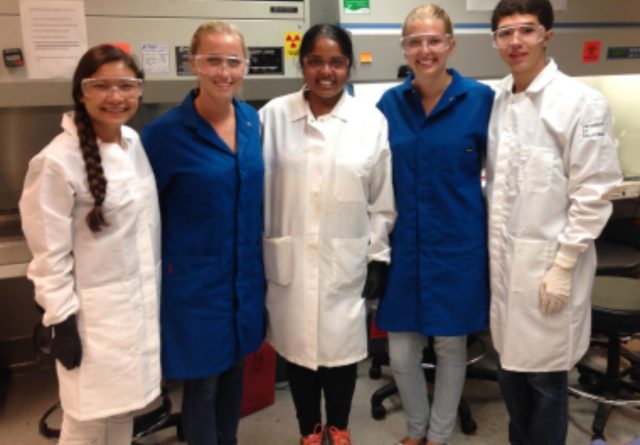Mentor
Anusha Pusuluri - Chemical Engineering
Advisors
Samir Mitragotri - Chemical Engineering
Hyongsok (Tom) Soh - Mechanical Engineering/Materials
Targeting Breast Cancer with Aptamer Constructs for Expedited Delivery
Interns
Jessica Andrews - Chemistry
Dorian Bruch - Chemical Engineering
Elaine Bunyan - Chemical Engineering
Valerie Lensch - CCS Chemistry

Project Description
The Mitragotri group engages in the research field of drug delivery and biomaterials. The group's research has advanced fundamental understanding of transport processes in biological systems and has led to the development of new materials as well as technologies for diagnosis and treatment of various ailments including diabetes, cardiovascular diseases and infectious diseases. Some particularly impactful areas have been : Transdermal drug delivery, Oral drug delivery, Micro and nanoparticles for targeted drug delivery and Synthetic Cells. (You can read more about this on our research group's website) Drug delivery can be broadly defined as the science and engineering of converting potent drugs into beneficial therapies. Successful drug delivery methods facilitate one or more processes including drug administration, absorption and targeting. At a fundamental level, the challenge in drug delivery reflects the fact that achieving the desired biodistribution of drugs in the body is limited by body's natural metabolic processes and transport barriers. The group's research aims at developing a fundamental understanding of these transport barriers and developing technologies that can overcome these limitations. More recently, the Mitragotri group also started focusing towards cancer drug delivery. Cancer has plagued humanity ever since its inception and continues to do so. According to WHO, cancer is one of the leading causes of death, with lung cancer alone causing 1.6 (2.9%) million deaths worldwide in 2012. NIH estimates 22 million new worldwide cancer cases in the next two decades with approximately 39.6% of men and women diagnosed with cancer at some point during their lifetimes. The leading limitation in cancer cure is not being able to deliver the desired drugs to the desired locations in the patient's body rather delivering it to undesired body parts causing severe side effects and toxicities. The group is starting to develop platforms that can overcome these limitations and deliver cancer drugs to the desired tumor locations in other words develop targeted cancer therapy platforms. Towards similar goals, the Soh research laboratory aims to develop novel materials and devices to improve the condition of human health. One of the two main research themes in the Soh lab is: Directed Evolution of Materials. Over billions of years, biological systems have evolved into organisms that can perform complex behaviors. In general, evolution requires only three basic elements: mutation (for diversity), selection (for function), and amplification (of the winning species). In the Soh lab's work, they use these evolutionary principles to synthesize new materials (aptamers) that do not exist in nature but can perform complex and useful functions. In particular, the group is interested in evolving polymer materials that can perform molecular recognition and shape-changes (conformation-switching) because these materials offer exciting avenues to improve molecular diagnostics and targeted therapies. My graduate work focus is on developing novel drug delivery platforms for targeted cancer therapy. The aim is to combine the unique research skill sets and findings from Mitragotri and Soh labs and develop next generation bio-reagents for cancer cure. In particular, my current project is to evaluate the efficiency and modularity of an aptamer system as a chemotherapeutic drug carrier and targeting agent. With an aim to promote the goals of both groups, this system is designed to overcome the transport limitations and deliver a variety of cancer drugs to the desired tumor locations. Preliminary invitro cell culture studies have been performed to evaluate the efficacy of this system and the initial results seem promising. However, currently a fundamental concept that we are trying to understand is the process of cellular uptake of this aptamer system. My interns' project will involve the characterization and understanding the process of cellular uptakes of such targeted drug delivery systems as compared to free drugs and non-targeted drug delivery systems.
Chemotherapy regimens treatment methods hold great remedial potential against cancer. Combination chemotherapy has been proven to have superior efficacies compared to single drug regimens. The current gold standard technology in chemotherapy is nanoformulations for delivering a synergistic drug pair. However, key problems remain to be addressed. For combination therapy, targeted formulations devoid of passive release during circulation, improved tumor penetration and cellular uptake are desired. In response to the above challenges, we propose aptamer constructs as a robust solution platform. The aptamer platform involves direct covalent conjugation of drug(s) to a targeting aptamer. Small molecule therapeutics are conjugated by a covalent link that is likely to remain stable during circulation and degraded upon stimulation specific to the tumor microenvironment or intracellular environment. This provides multiple layers of targeting specificity. In preliminary work, we have successfully designed aptamer conjugates that are able to deliver a pair of drugs specifically to cancer cells. The next step is to understand the process of internalization of these constructs. Live microscopy experiments will be done to identify differences in binding and internalization of constructs with aptamer, constructs without aptamer and free drug. The microscopy experiments will also be done on a control cell line where binding is not expected to verify targeting specificity.
Project Files
